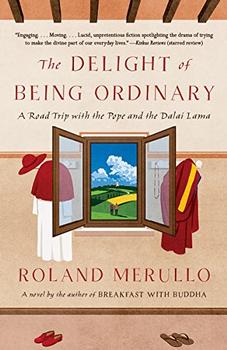Summary | Excerpt | Reading Guide | Reviews | Beyond the Book | Readalikes | Genres & Themes | Author Bio

A Road Trip with the Pope and the Dalai Lama
by Roland MerulloDay One
1
My name is Paolo dePadova—son of an Italian mother and an American infantryman father, and thanks to a peculiar combination of loyalty and luck I served, for a time, as First Assistant to my beloved cousin His Holiness the Pope of Rome. My tenure didn't last long. In fact, my duties came to an end as a direct result of the story I'm about to tell here, a story the Pope himself asked me to make public when I felt the time was right. Parts of it will be familiar from headlines in the international news, but, as you might expect, those parts were sensationalized, tarnished by rumor, stained with misinformation. The heart of it, the essence, the real, full story, remains known only to a handful of people, myself included. I share it now in a spirit of reverence and compassion, but also in service to the truth. As my cousin liked to say, "Anche i papi sono uomini." Which might be translated as "Popes are people, too."
2
My odd story begins, oddly enough, with a Buddhist. Or, at least, with the visit of a famous Buddhist to the most sacred halls of Roman Catholicism. It's common, of course, for a pope to receive visiting heads of state—presidents, prime ministers, first secretaries. Catholics have a great deal of clout in the world's voting booths, and politicians, even the least religious politicians, like to make a papal pilgrimage. They sit for a photo op with the Pontiff, pretend to exchange ideas, make promises they never intend to keep, then fly back to their luxurious lives and seats of power.
Popes, in my experience, handle these visits with an admirable patience. Disappointed again and again, they nevertheless always seem to hope that the leaders of the world will actually behave in ways that reduce the chance of war and give comfort to their poor.
In the case of the Dalai Lama's visit, however, the Holy Father had good reason for optimism. Here was a man whose responsibilities were similar to his own, and whose devotion to his faith and his people was beyond question. It was the second year of our joint tenure—the Pope's and mine—and probably the three hundredth official visit. I was used to the frenzied preparations: security precautions, press conferences, interviews. But when I went to see the Pope that morning I could sense, almost immediately, that the Dalai Lama's visit would not be typical.
My cousin liked to rise at four, spend three hours in prayer, and then take a light morning meal. On Tuesdays, Thursdays, and Saturdays when he was in Rome, Giorgio—as my parents and I had always called him—asked that I have breakfast with him in his relatively humble accommodations: a three-room suite at the Domus Sanctae Marthae hotel in Vatican City. Seven a.m. sharp.
This wasn't easy for me. At seven in the morning I'm not yet at my best—not that my best is very good at any hour—but out of devotion to the famous man and in deference to his inhumanly busy schedule, I always showed up on time. In order to reach the papal chambers, even with my top-secret Vatican credentials, I had to run a gauntlet of security officials and various secretaries. After doing so on that morning I went, at last, along a familiar, carpeted corridor and tapped on a set of wooden doors twice my height.
"Entra, cugino!" the Pope always yelled joyfully. Come in, cousin! That day it was no different.
The velour curtains hanging from the windows of his dining area had been pulled aside and, even at that early hour, a golden sunlight poured through the glass. The Pope was dressed casually in dark pants and a white T-shirt, a medal of the Blessed Mother looped on a thin chain around his neck. As was his custom and preference, he was barefoot (he liked to say it linked him, however subtly, with the poor of this world). The sunlight fell on one side of his face, catching a smile so sincere and sparkling it would have caused the most devoted atheist to convert. He gave me the warmest of embraces. Another minute and we were sitting opposite each other at a small, marble-topped table. An aide brought a typical breakfast—pear slices, pots of herbal tea, two pieces of Dutch chocolate the size of bottle caps. (The Pope is famous for his sweet tooth.) We prayed over the food and began to eat, but, knowing him so well, I could see a rising tide of trouble, a splash of anxiety on the skin of his face.
Excerpted from The Delight of Being Ordinary by Roland Merullo. Copyright © 2017 by Roland Merullo. All rights reserved. No part of this excerpt may be reproduced or reprinted without permission in writing from the publisher.




A classic is a book that has never finished saying what it has to say
Click Here to find out who said this, as well as discovering other famous literary quotes!
Your guide toexceptional books
BookBrowse seeks out and recommends the best in contemporary fiction and nonfiction—books that not only engage and entertain but also deepen our understanding of ourselves and the world around us.